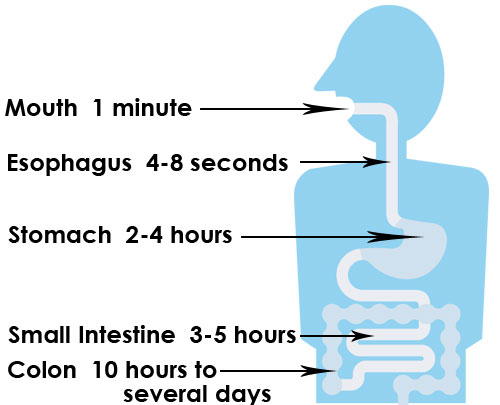TRANSIT TIMES
Transit time refers to the length of time it takes for food to be ingested, processed by the stomach and small intestine, pass through the large intestine and eventually eliminated.
While opinions vary on the subject, the vast majority concur between 18 to 24 hours is appropriate for a healthy colon.
Many people who eliminate every three to four days have a transit time of 72 hours to 96 hours. The slow passage of stool allows the chyme to putrefy, pathogenic bacteria to build up and parasites to thrive in the decaying stagnant material and be absorbed through the intestinal wall into the blood stream and circulated throughout the body.
Slow Transit Time = Constipation
Fast Transit Time = Diarrhea
If the food ingested can travel twenty plus feet in approximately six hours, it shouldn’t take almost four days to travel the last five feet!
Transit times are easily tested by eating something that can be clearly identified in the stool. For example, the ingestion of charcoal capsules or tablets, available at health food stores, will show up as black in the stool. Beets give a reddish
color and of course, whole kernel corn often passes through the system without significant change.
(how long food stays in each segment of the digestive system)

OUR DIGESTIVE SYSTEM
Many of the foods we eat every day contain inadequate nutrients and toxic substances, especially refined preprocessed foods with preservatives, artificial colors and flavors, hormones, antibiotics and pesticides that can often add additional
free radicals (unusable molecules that attack our cells) and fried and fast foods. After these foods are digested, our liver must work overtime to detoxify all toxic substances so that they can be excreted through our kidneys and skin.
We clean our face and body everyday, but people seldom think about cleaning the inside of the body, the intestines. When you pour greasy food, excessive dairy products, meats and other foods with toxic substances down your intestinal tract everyday, food residues build up. Food residues, combined with mucous secreted by mucous membranes in the colon, form layers of gluey feces which will build up in the pockets and may pile-up along the entire length of the colon and part of the small intestines, year after year.
Constipation becomes a normal lifestyle for some people. People have been known to carry 30-50 pounds of old dried up fecal matter in their intestines. Old feces does not pass generally out of the body like new waste, the old forms a home in the large intestine and needs special attention to dissolve the glue which binds the old waste to your intestinal wall.
If you let this decayed food residue accumulate in your intestines you will suffer from AUTOINTOXICATION (also known as autotoxicosis, enterotoxication, or self-poisoning). This is a disorder resulting from absorption of the waste products of metabolism, decomposed matter from the intestine, or the products of dead and infected tissue as in gangrene. The toxins can be carried by the blood stream to all parts of the body and end up in every cell, leading to various forms of illnesses.
Some people feel sluggish most of the time, finding hard to get up; some feel just the opposite, getting very little sleep, and may have aches and pains, such as headaches, gas and bloat, constipation, hemorrhoids or perforation, hernias, acid reflux, heartburn, and even colon cancer. If the problem gets to the point where diverticuli or colon cancer happen, you will then have to see a doctor specializing in gastro problems.
However, some clients come for health and well-being to avoid these problems. Some people with normal bowel movements hold about 3-5 pounds of waste in their intestine most of the time and don’t even know about these 3-5 pounds. People who have bowel movements every day want to avoid the problems stated above so they come for maintenance. People who eat out often come for a cleanse to avoid parasites, and people who just want to maintain a healthy body come for maintenance when they feel it necessary. Your colon therapist will provide you with information educating you in regards to your colon and your staying healthy.



 Get Directions
Get Directions The Global Professional
The Global Professional